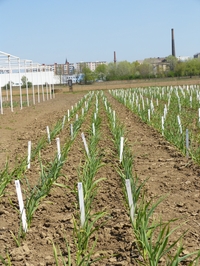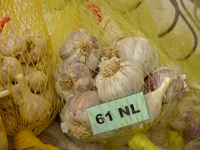Safeguarding of potato onion (Allium cepa L. Aggregatum group) and garlic (Allium sativum L.) crop diversity in North Europe - Baltic region
Activity Coordinator: Helena Stavělíková
The project "Safeguarding of potato onion (Allium cepa L. Aggregatum group) and garlic (Allium sativum L.) crop diversity in North Europe - Baltic region", submitted by the Allium Working Group for funding under the Fourth Call of the ECPGR Activity Grant Scheme, was selected by the Executive Committee and approved in December 2016.
- Activity proposal (165,6 KB)
Implementation
April 2023
The 2nd webinar on ECPGR Grant Scheme Activities, held on 17 April 2023, focused on the SafeAlliDiv project and was presented by Helena Stavělíková, Crop Research Institute [presentation available here (2,3 MB)], Czech Republic Dainis Runģis, Latvian State Forest Research Institute [presentation available here (659,7 KB)]. Click below to watch the recording of the webinar.
October 2020
The SafeAlliDiv published the following article: Genetic characterization of European potato onion (Allium cepa var Aggregatum G. Don) collections
January 2020
The Final Activity report and related data are now available:
- Safeguarding of potato onion (Allium cepa L. Aggregatum group) and garlic (Allium sativum L.) crop diversity in North Europe – Baltic region (SafeAlliDiv). Final Activity report (June 2017 - June 2019). (3,2 MB)
- SafeAlliDiv groups and unique genotypes [Excel]
- SafeAlliDiv morphological parameters [Excel]
April 2019
At the beginning of 2019, all partners sent the morphological descriptors used for their material to the Activity Coordinator, who compiled the tables and sent them back to all project partners in March. The results and the implementation of safety duplication are currently being discussed.
October 2018
The Interim Activity report for the period June 2017–June 2018 is now available.
October 2018
Further to the results of the DNA analysis carried out on 264 accessions, project partners from the Czech Republic, Finland, Latvia and Norway sent their feedback on safety duplications and other information to the Latvian State Forest Research Institute.
During summer the project partners evaluated the 264 accessions for morphological traits in the field.

April 2018
The second SafeAlliDiv project meeting was held 17-18 April 2018 in Olomouc, Czech Republic. The tasks agreed at the first meeting and their fulfilment status was checked. The tasks have been completed. The compilation of a guidebook on potato onion cultivation practices continues.
Participants from Croatia, Czech Republic, Estonia, Latvia, Lithuania, Finland, Norway and Sweden presented their accessions of potato onion/shallot (Allium cepa L., Aggregatum group) that had been sent for SSR analysis to the Latvian State Forest Research Institute. The colleague from the Latvian State Forest Research Institute presented the extensive results of the molecular analysis, whereby 132 unique genotypes were identified, based on 9 markers. On the other hand, 50% of the accessions were not unique. It was decided that over the next two months all project partners would receive the complete results of the DNA analysis and verify which accessions are unique within and between collections. Based on the project results, the group will be able to promote inclusion of unique accessions into the AEGIS European Collection, as well as systematically implement safety-duplication measures. Accessions selected for AEGIS will also be described morphologically. In August 2018, the project partners will start to prepare a scientific article about the project's results.
The group visited the Genebank of Vegetable and Specialty Crops in Olomouc,where they could observe a garlic collection and discuss the practical questions of maintenance of vegetatively propagated Allium. It was noted that the Dutch garlic collection, handed over to Czech Republic for long-term conservation, was doing well in the Olomouc field.

- Agenda (85,4 KB)
- List of participants (95,3 KB)
- Presentations given during the meeting
Harvested garlic accession from the former Dutch collection,
now conserved at Olomouc, Czech Republic, April 2018 (Photo: L.Maggioni, ECPGR)
January 2018
During autumn 2017 the Activity partners from Croatia, Czechia, Estonia, Finland, Latvia, Lithuania, Norway and Sweden sent the samples of potato onion (Allium cepa L. Aggregatum group) for DNA analyses to Latvia. DNA analyses are currently in progress.
The second SafeAlliDiv meeting will be held 17-19 April 2018 in Olomouc, Czech Republic.
October 2017
Further to the meeting, the Activity Coordinator has compiled the questionnaires that had been distributed to partners to gather information about their Allium collections: type of collection, type of conservation (in vitro, cryoconservation), source of new accessions, description, chemical analyses, DNA analyses, safety duplication, cooperation with other genebanks, current projects, other activities related to genetic resources. The summary was sent to all Activity partners and it was decided that the questionnaire would also be sent to all members of the Allium Working Group. Other tasks are in progress.
July 2017
The first SafeAlliDiv project meeting was held 11-12 July 2017 in Tallinn, Estonia. Participants from Croatia, Czechia, Estonia, Latvia, Lithuania, Finland, Norway and Sweden presented the situation about Allium crop cultivation and conservation in their respective countries, with particular emphasis on potato onion/shallot (Allium cepa L., Aggregatum group) and garlic (Allium sativum L.).
The project aims to complement the existing molecular marker analysis of Nordic potato onions that was recently carried out in Sweden, with analysis of additional material from partner countries, in order to reach a better understanding of existing genetic diversity in collections and in the fields. The group agreed on criteria to select and acquire accessions, to be sent to the Latvian State Forest Research Institute for molecular analysis. The same material will also be characterized morphologically.
Based on the project results, the group will be able to promote inclusion of unique accessions into the AEGIS European Collection, as well as systematically implement safety duplication measures.
The group visited potato onion fields in the Lake Peipus area, where traditional cultivation is based on heterogeneous seed-propagated material, differently from the customary use in other countries to grow this crop from bulbs. Different propagation methods have implications on heterogeneity of the product as well as on its phytosanitary status. The project intends to compile a guidebook on potato onion cultivation practices.
- Agenda (191,0 KB)
- List of participants (79,2 KB)
- Presentations given during the meeting